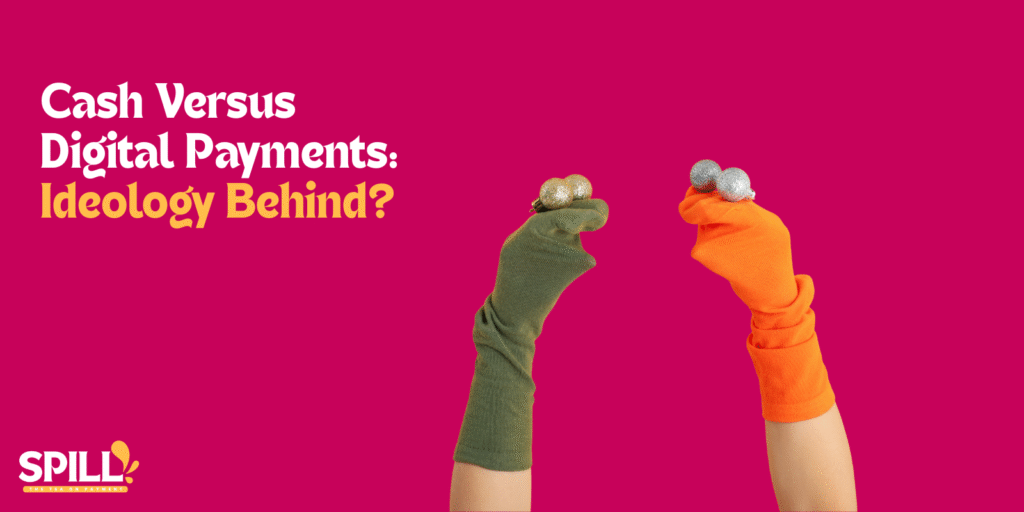The cash versus digital payments narrative is everywhere. Each year, someone declares the death of cash. Digital payments (from cards to wallets) are framed as inevitable progress. But that narrative hides complexity, ideology, and power.
Cash versus digital payments: an ideological battleground
A strong and productive narrative in the industry is that cash is soon to be dead. Each year, we predict the death of Cash. Cashless payment instruments like cards, digital wallets or A2A payments should replace it. While the push of digital payments is real, one should be cautious about declaring this a March toward progress. Proclaiming cashless solutions are a progress is changing the lens of the debate. Cash or cashless has become an ideological issue. And it becomes acute when the system of digital payments is unable to fulfil the needs to pay. In Spain, during the mega electric outage, people were unable to pay, without alternatives. It created strong emotional reactions for and against cash.
When there is ideology, there are power dynamics and narratives.
Cash has become an unwanted companion, and money laundering, dirty activities and informal work as a cohort. COVID has accelerated this trend as cash is unhygienic and capable of transmitting disease. Plus, the emergence of smartphones has also created some sociological fractures around cash. Cash is now associated with older people, illiterate in technology. Being cashless can even become trendy, showing we get out of the « old world ».
Who’s behind the “better than cash” narrative?
Some international organisations like the World Bank, as well as the Better Than Cash Alliance, a UN Development program whose members include governments, international organisations, and private companies, actively promote the use of digital payments and fuel this consensus. Interestingly, those organisations do not actively campaign against cash. Better than Cash states: « Members do not want to abolish physical cash, it is legal tender, but rather want to provide responsible digital payment options that are ‘better than cash’ ». They therefore, rather support a pro-digital payment movement. Better than Cash has MasterCard as one of its funding partners.
Better than Cash alliance campaigns for an inclusive and transparent digital payment. However, fragmentation and the sometimes monopolistic practices of the industry don’t favour the ambition of the Better than Cash alliance. Digital payment can be as opaque as Cash.
Cash in a fractured digital payments landscape
Fragmentation of digital payments is becoming evident, especially in Europe. After the adoption of Payment Service directives, the number of Payment Institutions and E-Money Institutions has exploded. The industry, once pretty unified, has fragmented. Today, consumers have too many choices when they have to go to pay, countless wallets, apps and cards.
In addition to that plethora of choices, fragmentation is detrimental to economic actors. The recent action of several lobbying entities of retailers (EuroCommerce, Ecommerce Europe, Independent Retail Europe, the European Association of Corporate Treasurers and the European Digital Payments Industry Alliance.) against the international schemes (Visa, Mastercard) to the European Commission proves it. Too many choices prevent clarity, usability, especially when interoperability is not at the core of regulators’ preoccupation
So, stating that digital payments are better than cash is ideological. The existence of structures within the scheme to actively promote the usage of the digital payment product proves it. A whole galaxy of Visa Initiatives (Visa Economic Empowerment Institute (VEEI), Visa’s Financial Inclusion Lab / Digital Financial Inclusion Program, Visa Foundation), and Mastercard through Mastercard Centre for Inclusive Growth invest 400M USD globally to promote inclusion, cashless transactions.
A Region of Resistance: How the Balkans Embrace Both Cash and Digital
Ok, interestingly, in some regions, cash is showing some strong signs of resistance. The Balkan example is actually quite good. Cash is not a barrier, but with a whole context to think about, historical, political, etc…
EMI (E-Money Institutions) and PI (Payment Institutions) are less important than in other parts of the European Union. Croatia, Romania, Slovenia, Bulgaria and Greece altogether account for only 6% of the total of non-banking institutions in UE. Banking rate is higher than it used to be 10 years ago. But it remains lower than in the rest of Europe, except for Slovenia. (Figures from EUCLID)
Emerging digital initiatives around payments exist: Flik and the IRIS instant scheme in Slovenia and Greece. The long existence of DinaCard in Serbia is also a good example. The Serbian scheme clearly states that it actively fights against informal work.
What the Balkans teach us about pragmatic cash use
But the Balkans can also pragmatically adapt to the reality of cash. FINA (Financijska agencija) in Croatia is a public institution that guarantees access to cash for everyone, whether you are a corporate customer or an individual. FINA provides services around bill payment, cash distribution, and collection, and the results are visible. Croatia has one of the highest rates of ATM available in Europe, 141 ATM per 100,000 adults, the EU average being 62.
Cash is also seen as a revolving and tangible asset that we can easily distribute. It also symbolises immediate payment in a part of Europe that does not value interpersonal trust. Years and years of conflict, scandals of corruption, the legacy of socialism and its generalised surveillance led to a particularly low trust index. In the question, most people can be trusted, only 3% of Albanians and 8% of Greeks answered yes. The rate in former Yugoslavia is slightly better. On the other hand, 62% of Swedish people said you can trust most people. Is it a coincidence if Cash has heavily declined?
A false binary: we need both cash and digital
The question of cash as a dangerous, dirty and unhygienic instrument is a narrative actively pushed by organisations who see their interest: better control of capital, possibility to develop new sources of revenue for the financial sector, lowering the cost of compliance and AML measures. The heavy resistance to cash as a payment instrument is also a sign that people resist the narrative. In Sweden, Erik Thedéen, the governor of Riksbank, Central bank of Sweden, stated in an interview with The Banker: “We now need to think about resilience, […]If everything break[s] down, we [need to] have cash.”
The question is not around cash or non-cash. It is about finding a spot for both. Where it makes sense to use them. In e-commerce, using cash is difficult and creates a lot of user experience friction. But digital payment also needs to overcome its fragmentation aspect to guarantee interoperability, lower cost and safety.







